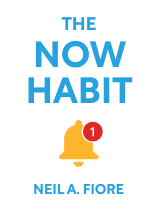

This article is an excerpt from the Shortform book guide to "The Now Habit" by Neil A. Fiore. Shortform has the world's best summaries and analyses of books you should be reading.
Like this article? Sign up for a free trial here.
Do you tend to procrastinate until the last minute? How can you prevent procrastination before it takes hold of your mind?
The longer you procrastinate on an unpleasant or difficult task, the harder it is to get yourself to do it. That’s why it’s important to counteract procrastination before it has a chance to get started.
Here’s how to prevent procrastination before it’s too late.
Breaking Down Projects
Sometimes we procrastinate because we’re overwhelmed by the enormity or complexity of the task in front of us. We’re not sure what to do, and we doubt our ability to complete the work. Other times, we underestimate how much work will be needed or how long it’ll take. To help avoid these problems, Fiore recommends breaking down large projects into smaller steps.
For example, say you want to buy Christmas presents for your friends and family. If you just add “buy Christmas presents” to your to-do list, you might find yourself avoiding the task—it sounds like a lot of work, and you’re not immediately sure what needs to be done. Plus, it’s only October, so you have plenty of time. This is a recipe for procrastination: The task itself is complex but ill-defined, which encourages you to put it off until you start panicking about the deadline and beating yourself up for not starting sooner—neither of which will help your shopping (or your holiday spirit).
(Shortform note: Productivity expert David Allen develops this idea further by distinguishing between tasks and projects. In Getting Things Done, Allen defines a project as anything that requires more than one step to complete and argues that you can’t actually work on a project—only its component tasks. In other words, if you aren’t careful to distinguish between projects and tasks, you might end up procrastinating simply because you’re erroneously trying to “do” a project (like “buy Christmas presents”) rather than a task.)
Fiore says you can avoid these problems if you know how to prevent procrastination—first by breaking down “buy Christmas presents” into its component tasks. These tasks might include making a list of everyone you want to give presents to, brainstorming present ideas for each recipient, and so on. Next, Fiore recommends that you set deadlines for each step in the process. For example, if you’re mailing presents, you’ll need to know the last date to ship with guaranteed delivery by Christmas.
Emphasize Starting Rather Than Finishing
Even once you have a detailed plan for tackling a major project, you might still find yourself procrastinating instead of doing the work. Fiore says this is another place where perfectionism gets in our way. He explains that we often focus too much on the end product—and because we want the finished product to be perfect, we never take the first steps of actually starting.
To counteract these tendencies, Fiore recommends you think of a project as a series of small starts. This advice works well with the previous suggestion to break down projects into their component tasks—instead of worrying about how you’ll finish all of your Christmas shopping, you can consult your list of small tasks and decide which one to start in your next 30-minute work session. (Shortform note: There’s value in getting started especially when you don’t feel like doing so or when you feel like you don’t know how to do something. As Mark Manson points out in The Subtle Art of Not Giving a F*ck, we often wait to be inspired to work on something when in reality, action leads to feeling inspired.)
Focusing on starting is also a psychological shift—it doesn’t literally mean that you always start something new and never come back to a partially completed task. The idea is that emphasizing starting instead of finishing removes the pressure to be perfect or to get things right the first time. Fiore warns that sometimes we think we’re working on a project when in fact we’ve fallen into a trap of never-ending research, preparation, and planning—past a certain point, he says, activities like these are just another form of procrastination.
(Shortform note: Starting sometimes means deliberately doing an imperfect job. For example, in Bird by Bird, writer Anne Lamott suggests beginning every writing project with a “sh**ty first draft”—just getting words down on the page without worrying about phrasing, typos, or even whether your ideas make any sense. The idea is to break through perfectionism with the knowledge that once you’ve made a first effort, you’ll have something you can later refine into a more polished product.)

———End of Preview———
Like what you just read? Read the rest of the world's best book summary and analysis of Neil A. Fiore's "The Now Habit" at Shortform.
Here's what you'll find in our full The Now Habit summary:
- Why people tend to put off the things that matter the most
- Where procrastination stems from, and why it doesn't mean you're lazy
- How to get more done while still maintaining a balanced life






